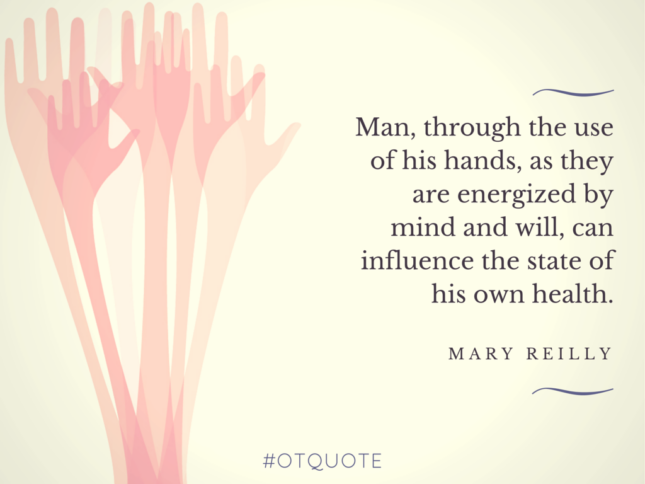
The profession of occupational therapy is rooted in a rich history and maintains an ever growing brightness in its future. In 1962, occupational therapist, Mary Reilly remarked in her Eleanor Clarke Slagle lecture, “Man, through the use of his hands, as they are energized by mind and will can influence the state of his own health.” Over 60 years later, those words still encompass occupational therapy (OT) so well, emphasizing how important engagement in meaningful occupation is for everyone.
Occupational Therapists (OT’s) define “occupation” as any activity a person wants or needs to do as part of their daily life. OT’s use occupations as both the foundation of their intervention as well as the focus of the patient outcomes to promote health, well-being and to improve a person’s ability to participate in life activities. OT grew out of the mental health field and the moral treatment movement of the 1800’s when the treatment of mental illnesses shifted to a belief that recovery was enhanced when a person was engaged in routine activities of daily life (occupations).
The profession was born in 1917, the same year the U.S. entered World War I. The sudden need for rehabilitation of soldiers from physical injuries and shell shock, was formative in occupational therapy falling under the umbrella of physical medicine as well as mental health. Today the lens of an OT seeks to capture the whole person, considering multiple factors intrinsic to the person and those found externally in their surroundings and environment (Table 1). OT’s look at these factors in combination and consider how they ultimately impact a person’s ability to participate in and perform occupations. Through the OT process of evaluation, assessment and interventions, OT’s focus solutions and treatments that will promote their participation in the activities or occupations that matter most to the patients we serve.
| Factors Impacting Participation and Performance in Activities (Table 1) – Physiological: sleep, nutrition, strength, flexibility, stress – Cognitive: memory, attention, thinking processes – Spiritual and Psychological Factors – Neuro-behavioral: coordination, balance, sensory – Social Supports, Social policies and economics, and Culture & Values – The built and natural environments |